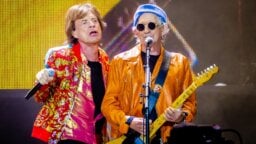Anti-poverty advocacy group Global Citizen has launched a new project to help raise communities out of poverty through the development of their music industries.
The Music Economy Development Initiative (MEDI) was unveiled this week at the Global Citizen NOW summit in New York. The project will be led by Global Citizen and the non-profit Center for Music Ecosystems (CME), with backing from Universal Music Group and the International Finance Corporation (IFC).
MEDI will focus on carrying out research on the state of the music ecosystem and its economic potential in 22 countries initially, with plans to expand to other countries in the future. It will use that research to make recommendations and enable partnerships to grow music’s potential in Africa and around the world.
Among those partnerships is Global Citizen’s Move Afrika, which organizes music events as part of an effort to create job and entrepreneurship opportunities across the continent.
MEDI’s research will be made public on its online portal.
“719 million people around the world live in extreme poverty, with deeply harmful consequences for their health and life expectancy, as well as their access to education and basic services, among other things. Every tool at our disposal must be deployed to address this dreadful reality,” said Shain Shapiro, Executive Director at the CME, a research and development organization focused on social and economic development through music.
“One such tool, which can literally be found everywhere and effectively combats the scourge of extreme poverty, is music. The power of music is manifold: it can inspire humanity and unite us. It can console us and heal us. And music can drive economic growth and create jobs. It can spur responsible economic development to help communities in crisis”.
“Music can drive economic growth and create jobs. It can spur responsible economic development to help communities in crisis.”
Shain Shapiro, Center for Music Ecosystems
But this economic development doesn’t happen on its own, Shapiro added. “It requires the proper infrastructure and legal framework and investment of resources and work-hours to build it. MEDI aims to address this and amplify the power that music can have by providing data, evidence, and research, guiding the development of the systems and policies that can help spur successful and responsible economic development with the proper engagement of the music community and its partners.”
Notably, one of Global Citizen’s board directors is Michele Anthony, Executive Vice President at Universal Music Group.
“Having spent my entire life and career in music, I have always recognized its power as a change agent. It brings us joy and salves our pain. Medical research shows that it can literally heal us,” Anthony said in a statement.
“That’s why, today, on behalf of Universal Music Group and as a founding member of Global Citizen, I am incredibly proud that together we are launching the Music Economy Development Initiative.
“This collaboration harnesses music’s power as a force for social and economic change, fighting poverty and building sustainable careers for artists, composers, and the creative community worldwide. This research shows that with proper public policies and infrastructure in place, creative communities don’t just survive, they can truly thrive.”
“This collaboration harnesses music’s power as a force for social and economic change, fighting poverty and building sustainable careers for artists, composers, and the creative community worldwide.”
Michele Anthony, Universal Music Group / Global Citizen
MEDI is currently planning two pilot studies, one with the Ministry of Culture and Francophonie of Côte d’Ivoire and another with the Federal Ministry of Art, Culture, Tourism, and the Creative Economy of Nigeria, co-financed by the IFC.
“By promoting research, partnerships, and investment in music through the MEDI platform, we aim to catalyze more private and public sector participation in the creative sectors, foster jobs, and shape a positive policy landscape for growth,” said Germán Cufré, IFC Global Manager for Telecom, Media and Technology Investments and Creative Industries.
A part of the World Bank Group, IFC operates in more than 100 countries, and last year it committed a record $56 billion to private companies and financial institutions in developing countries. It bills itself as the world’s largest global development institution.
“For years, we had the passion, but not the data,” said Raoul Rugamba, CEO of Africa in Colors. “We needed the data to convince anyone that we had a job, that they could invest in us, for us, the community, the impact and the social and economic development a country needs. The MEDI tool will not only help us invest more and better, but also convince and mobilize more investments and investors.”
Global Citizen first telegraphed its plans for MEDI at the 2024 Global Citizen NOW summit, where it shared a vision for how development of music can help eradicate poverty.
In February of this year, the CME released a policy paper titled Why we need train tracks before we can run trains, arguing for the need to build music industry infrastructure in less-developed countries. The paper was authored by CME’s Shapiro and noted music economist Will Page.
Established in Australia in 2008, Global Citizen says it has facilitated the deployment of $49 billion in commitments, impacting 1.3 billion lives.Music Business Worldwide




